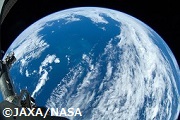| タイトル | French Program of Science in Microgravity |
| DOI | info:doi/10.15011/jasma.33.330203 |
| 著者(英) | Delaroche, Christophe |
| 著者所属(日) | フランス国立宇宙センター(CNES) |
| 著者所属(英) | Centre National d'Etudes Spatiales (CNES) |
| 発行日 | 2016-04-30 |
| 発行機関など | Japan Society of Microgravity Application (JASMA)
日本マイクログラビティ応用学会(JASMA) |
| 刊行物名 | International Journal of Microgravity Science and Application (IJMSA) |
| 巻 | 33 |
| 号 | 2 |
| 開始ページ | 330203-1 |
| 終了ページ | 330203-3 |
| 刊行年月日 | 2016-04-30 |
| 言語 | eng |
| 抄録 | CNES, the French space agency, covers five major areas of activity: Ariane launcher, Science, Earth observation, Telecommunication and Defense. In the Science area, in order to better understand the origin of the Universe, further our knowledge and understanding of its constituent parts, the CNES science program develops and exploits space instruments to study astrophysics, fundamental physics, solar system, exobiology and supports science in and for microgravity. The Physical science program covers hydrodynamics, evaporation, transfer, supercritical fluids, particles and suspensions, foam, material solidification, gas and solid combustion… The objective is to help laboratories simplify the study of various physical phenomena through access to microgravity. These research themes are mainly studied in relationship with European Space Agency. About 150 French scientists are involved in more than 40 ESA Topical Teams. In France, with the CNES support, forty laboratories are assembled in an association of researchers using microgravity. An annual meeting is organized to exchange about main updates and discuss possible improvement and cooperation. CNES Science program funds the necessary complement to develop or adapt the scientific instruments to space experimentation. This funding contributes also to the data use, simulation and numerical modeling. Numerical simulation, tests in the zero-G airplane and then long term experiments in ISS is the regular way to take progressively advantage of the space facilities. This is made essentially through the ESA organization frame but also in direct cooperation with other space agency, within or outside Europe. Indeed, CNES has direct access to ISS independently of the ESA program through cooperation with NASA that guaranties use of the ISS beyond 2020.Solid skills of the French community in instrumentation, modelling and simulation are widely recognized and we hope that future cooperation, supported by CNES through access to the zero-G test environment, can be developed in the future. |
| キーワード | CNES; Physical Science; Microgravity; zero-G airplane |
| 資料種別 | Journal Article |
| NASA分類 | Life Sciences (General) |
| ISSN | 0915-3616 |
| NCID | AN10537663 |
| SHI-NO | AA1640091000 |
| URI | https://repository.exst.jaxa.jp/dspace/handle/a-is/571327 |
|

